.jpg)
Tourists visit the greenhouse growing Japanese cucumbers (Mazer variety) of Mr. Nguyen Tuan Anh (Binh Minh ward) (Photo: TAM GIANG)
Applying high technology to cultivation
On the small road leading to Hamlet 2, Thanh Hoa (Thanh Loi commune), people can come across lush, fruit-laden lime gardens. Among those vast gardens, Mr. Tran Van Linh's model stands out for its professionalism in organizing production and applying new technology. With 2 hectares, Mr. Linh decided to switch entirely to growing seedless limes according to VietGAP standards. This was not an easy decision, because investing in an automatic irrigation system, technical infrastructure, and standard cultivation processes costs tens of millions of VND.
“At first, I was very hesitant, but I thought that if I didn't change, I would forever be stuck with the refrain of "good harvest - low price", depending on traders" - Mr. Linh confided. The automatic irrigation system not only provides the right amount of water but can also combine fertilizer into water, helping plants absorb nutrients quickly and evenly. Thanks to that, 30-40% of irrigation water is saved, significantly reducing the amount of fertilizer and labor. "Compared to manual methods, the efficiency is outstanding. In particular, the lime garden has few pests and diseases, the fruit is uniform, and it is easy to meet export standards" - Mr. Linh said.
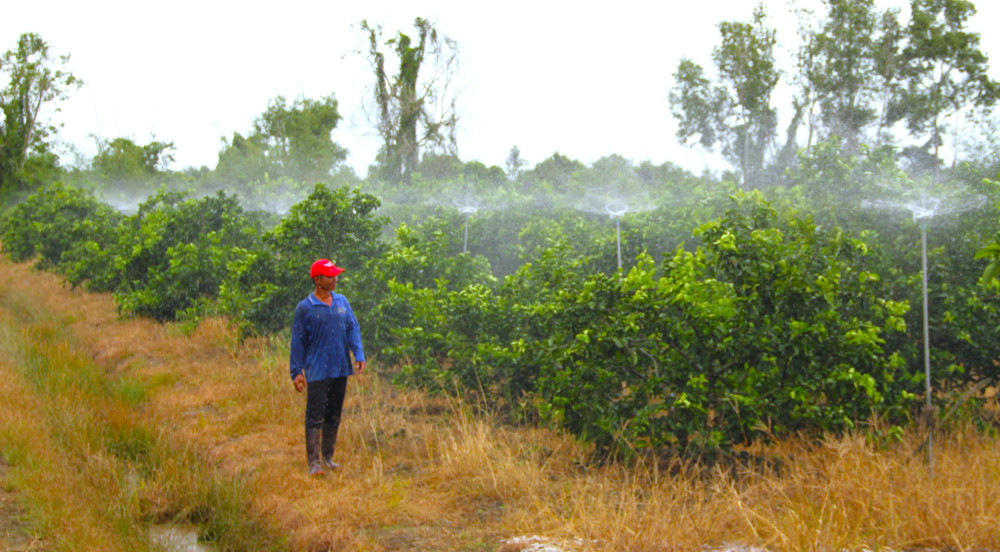
The automatic irrigation system helps Mr. Tran Van Linh's lime garden grow evenly, reducing costs and labor
Mr. Linh's greatest success is not only in the production stage but also in the output link. Instead of selling to the market, he signed a product consumption contract with The Fruit Republic Can Tho Company Limited - a business specializing in exporting fruit to Europe and the US. According to the contract, limes that meet VietGAP standards are purchased at a price 3,000-5,000 VND/kg higher than the market. “With a business guaranteeing the purchase, farmers can feel secure in production. More importantly, the production mindset has changed. Farming requires long-term thinking.” Linh affirmed.
In the nearly 3,000m² greenhouse of Mr. Nguyen Tuan Anh (Binh Minh ward) are rows of lush green cucumbers. He shared: “Cucumbers are not drought-tolerant. If grown outdoors, especially during prolonged hot weather, the leaves will easily turn yellow, the fruit will curl, and the yield will be low. Thanks to the greenhouse, combined with the recirculating drip irrigation system, cucumbers can maintain stable humidity and grow better than outdoors.”
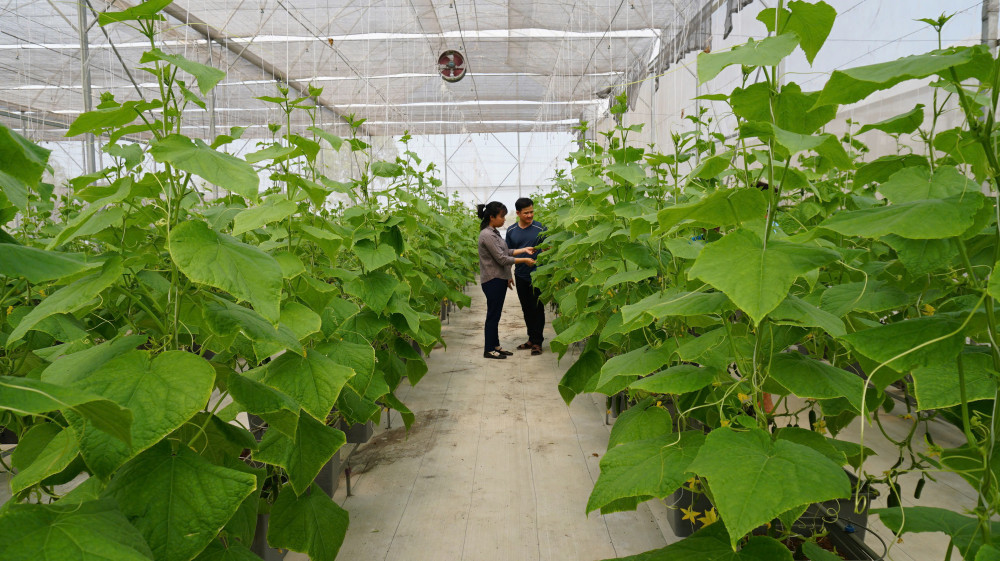
Mr. Nguyen Tuan Anh's modern greenhouse cucumber growing model in Binh Minh ward
In fact, in recent years, Tay Ninh has faced drought, but thanks to a complete irrigation system, the water source for production is guaranteed, so the crops grow well. Taking advantage of this, Mr. Tuan Anh boldly invested in modern technology such as greenhouses to reduce heat, recirculating irrigation systems to save water and fertilizer, and environmental control with sensors. Growing cucumbers this way, the fruits are uniform, bright in color, with few pests and diseases, and a yield of 5-6 tons/crop/3,000 m². More importantly, the products are safe, meeting the requirements of supermarkets, collective kitchens, and demanding consumers. "Now, I no longer worry about cucumbers being difficult to sell and having low prices because the products are beautiful, of guaranteed quality, and easy to sell" - Mr. Tuan Anh said.
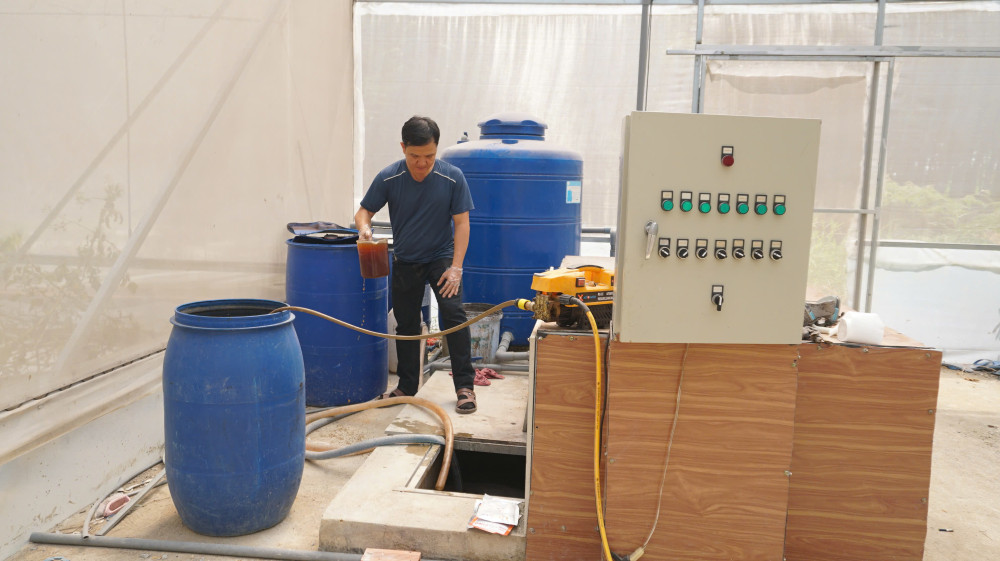
Mr. Nguyen Tuan Anh applies drip irrigation technology to mix fertilizer directly into the water source, helping to save 30-40% of production costs
Closed-loop wild boar farming
In recent time, the complicated developments of African swine fever and the high price of animal feed have caused pig farmers to struggle, while consumers are more interested in clean food, organic products, etc. These are the reasons that prompted Mr. Lam Hai Dang (Thanh Loi commune) to look for the 5-guaranteed Wild Boar Raising model (guaranteeing output for the entire contract of 3-5 years (buying the entire herd at once with the lowest price of 85,000 VND/kg of live boars); guaranteeing techniques, transferring the raising process; guaranteeing births (from the second litter, if the boar gives birth correctly, and cannot raise the piglets, it will be exchanged for another breed); guaranteeing support for dead boars (within 7 days of boar's death, 100% support will be given, in the first year boars that die due to African swine fever, 50% support will be given to re-herd) and guaranteeing risks (in the first year, in case of boar death, farmer can exchange for other boars).
Mr. Dang shared, “Raising wild boars does not require too much care, 70% of the feed is taken from agricultural waste or herbs in the garden; wild boars have good resistance. However, if raised on a small scale, it is difficult to find a stable consumer market. With more than 12 years of working in the field of sales from the East to the West, I began to cherish the idea of raising wild boars in a closed system from input to output. Accordingly, I will transfer science, technology, and breeds, and sign output contracts for farmers when participating in the model.”
To participate in the model, farmers must comply with the regulations set out by the Heru Group Long An. Specifically, farmers must not arbitrarily sell piglets and boar to the outside; not arbitrarily increase the herd; absolutely not allow strangers to visit; and raise more than 3 sows and 1 male. However, farmers will be implementing the 5-guaranteed policy by Heru Group Long An.
With a clear breeding process, Mr. Dang's Heru Group has received the approval of farmers. Currently, he is signing contracts with more than 130 households in and outside the province to implement the model. On average, each month, he buys about 300 boars, weighing from 20-30kg/boar. The consumption market is in clean food supply chains or restaurants in Ho Chi Minh City. Regarding breeding boars, the market supplies 40-50 boars/month.
Mr. Do Quang Truong (Duc Hue commune, Tay Ninh province) said: "Initially, I raised 3 sows and 1 male with an investment cost from building a barn to breed of nearly 50 million VND. The family sold the first batch of boars for 55 million VND. Currently, we have expanded the barn to increase the herd. The boars are fed with sweet potato leaves and bananas grown around the house. The family is preparing to export the second batch, with profit of about 50 million VND after deducting all costs.”
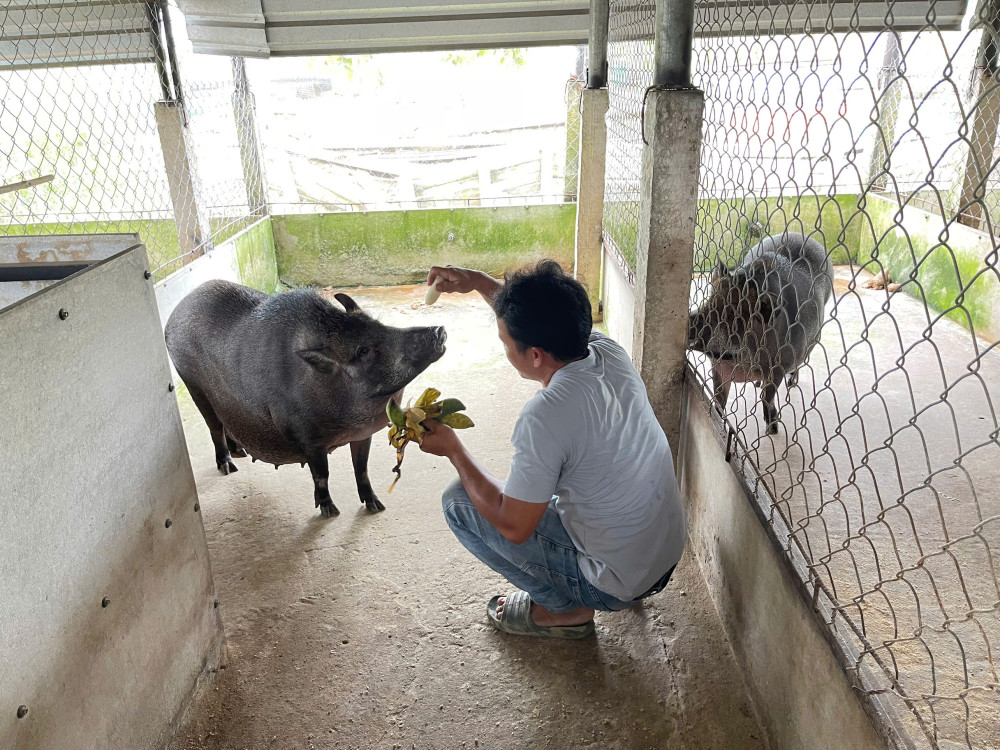
Mr. Do Quang Truong (Duc Hue commune) has a stable income from the 5-guaranteed wild boar raising model
The output for agricultural products has always been a difficult problem, because in reality, farmers often face the situation of good harvest, low prices or vice versa. Mr. Hai Dang shared, “With technical guidance, farmers can do well on production. Only the consumption stage is difficult. Therefore, I established Heru Group Long An so that farmers can feel secure in raising livestock. As for the technical part, I hired a team of engineers and bought the wild boar raising process of another unit, especially applying AI technology to help improve breeding techniques suitable to the actual situation and support farmers.”
It can be seen that the common point of the models is the bold change in production mindset, applying advanced technology to improve productivity, quality and value of agricultural products. This is also the inevitable path for Tay Ninh agriculture to develop in a green, clean, sustainable direction, meeting the increasingly strict requirements of domestic and international markets./.
By Staffs - Translated by Q. Thien
Source: https://baolongan.vn/cong-nghe-cao-mo-loi-cho-nong-nghiep-xanh-sach-va-ben-vung-a203940.html
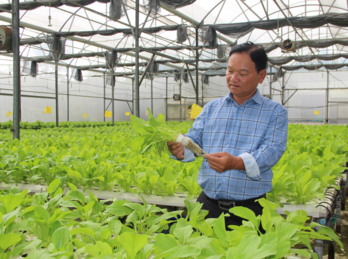 Towards sustainable agricultural development
Towards sustainable agricultural development

.jpg)





